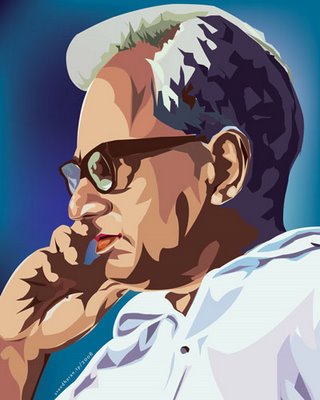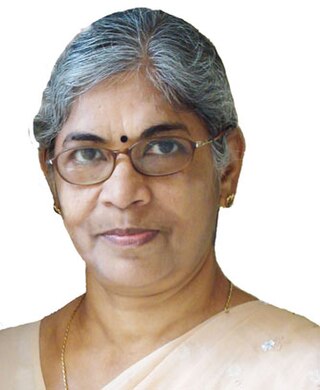
G. Sankara Kurup, also referred to as Mahakavi G, was an Indian poet, essayist and literary critic of Malayalam literature. Known as one of the greats of Malayalam poetry, he was the first recipient of the Jnanpith Award―the highest Indian literary honor. He served as a nominated member of the Rajya Sabha from 1968 to 1972 and received the Padma Bhushan, the third highest Indian civilian award, in 1967. He was also a recipient of Sahitya Akademi Award, Kerala Sahitya Akademi Award and Soviet Land Nehru Award.

Ulloor S. Parameswara Iyer, born Sambasivan but popularly known as Ulloor, was an Indian poet of Malayalam literature and a historian. He was one of the modern triumvirate poets of Kerala in the first half of the 20th century, along with Kumaran Asan and Vallathol Narayana Menon. Umakeralam, a mahakavya, and Kerala Sahitya Charitram, a comprehensive history of the Malayalam language are two of his most important works.

Lalitha Lenin is an Indian poet in Malayalam.
N. V. Krishna Warrier was an Indian poet, journalist, scholar, academician and political thinker. A prolific writer, Warrier's works covered the genres of poetry, drama, travelogue, translation, children's literature and science. He was a recipient of the Sahitya Akademi Award and the Kerala Sahitya Akademi Award for Poetry. The Kerala Sahitya Akademi honoured him with their fellowship in 1986, three years before his death in 1989.

Vishnunarayanan Namboothiri was an Indian writer and scholar of Malayalam literature. Known primarily for his poems, Namboothiri also contributed to other genres such as essays, translations and children's literature. Swathanthrathe Kurichu Oru Geetham, Bhoomigeethangal, Indiayenna Vikaaram and Charulata count among his notable works. The Government of India honored him with the fourth highest civilian award of the Padma Shri in 2014 and the Government of Kerala awarded him the Ezhuthachan Puraskaram, the highest literary award in Malayalam, the same year. He was also a recipient of Vayalar Award, Vallathol Award, Kerala Sahitya Akademi Award for Overall Contributions, Asan Prize, Sahitya Akademi Award and Odakkuzhal Award.

Sooranad P. N. Kunjan Pillai was an Indian researcher, lexicographer, poet, essayist, literary critic, orator, grammarian, educationist, and scholar of the Malayalam language, best remembered for his contributions in compiling Malayala Maha Nighantu, a lexicon. The Government of India awarded him the fourth highest civilian honour of the Padmashri in 1984 for his contribution to Malayalam literature and education. He was also a recipient of the Vallathol Award in 1992 and when the Government of Kerala instituted the Ezhuthachan Puraskaram, their highest literary honour in 1993, he received the inaugural award.
S. Guptan Nair was an Indian scholar, academic, critic and writer of Malayalam literature. Known for his literary works as well as for his oratorical skills, Nair was a prolific writer with over 35 books to his credit. He was a distinguished fellow of the Kerala Sahitya Akademi and a recipient of several honours including Kendra Sahitya Academy Award, Kerala Sahitya Akademi Award, Vayalar Award, Vallathol Award and Ezhuthachan Puraskaram, the last one being the highest literary award of the Government of Kerala.

V. Madhusoodanan Nair is an Indian poet and critic of Malayalam literature, who is credited with contributions in popularizing poetry through recitation. He is best known for Naranathu Bhranthan, the poem with the most editions in Malayalam literature as well as his music albums featuring recitations of his own poems and poems of other major poets. Kerala Sahitya Akademi honoured him with their annual award for poetry in 1993. He is also a recipient many other honours including Sahitya Akademi Award, Asan Smaraka Kavitha Puraskaram, Padmaprabha Literary Award, Kunju Pillai Award, R. G. Mangalom Award, Souparnikatheeram Prathibhapuraskaram and Janmashtami Puraskaram.
Kainikkara Padmanabha Pillai (1898–1976), popularly identified as Swathithirunal Kainikkara Padmanabha Pillai after his magnum opus, Swathithirunal, was an Indian author of Malayalam literature, actor, speaker, teacher and thinker. He was known for his plays which dealt with themes such as patriotism, sacrifice and justice and his characters showed heroism, showing influence of William Shakespeare. Kerala Sahitya Akademi awarded him their annual award for drama in 1970. He was also a recipient of the Kalyani Krishna Menon Puraskaram.

George Onakkoor is an Indian novelist who writes in Malayalam language. He was a Malayalam professor for over three decades at Mar Ivanios College, Trivandrum, Kerala.

N. Krishna Pillai was an Indian dramatist, literary critic, translator and historian of Malayalam language. Known for his realism and dramatic portrayal of psycho-social tensions, Pillai's plays earned him the moniker, Kerala Ibsen. He was a recipient of the Sahitya Akademi Award, Kerala Sahitya Akademi Award for Drama, Odakkuzhal Award, Vayalar Award and Kerala Sangeetha Nataka Akademi Award, besides other honours. The Kerala Sahitya Akademi inducted him as a distinguished fellow in 1979.

Narayanan Nambuthiri Kakkad, commonly known as N. N. Kakkad, was an Indian poet of the Malayalam language. Known for works such as Saphalmee Yathra, Pathalathinde Muzhakkam and Changatham, he was a Sanskrit scholar and was known to have been proficient in painting and music. He was a recipient of several awards including Odakkuzhal Award, Asan Smaraka Kavitha Puraskaram, Kerala Sahitya Akademi Award for Poetry and Vayalar Award.

V. R. Prabodhachandran Nayar, popularly known as VRP Nayar, is a Phonetics expert of Kerala. He is the pioneer in the study of the phonology of the Malayalam language. Apart from phonology, he is also interested in syntax and stylistics.

P. K. Rajasekharan is a literary critic in Malayalam language, and is the winner of Kerala Sahitya Akademi Award for Literary Criticism in 1997. Rajasekharan is an orator, author, and editor of various books. He was news editor of the Mathrubhumi newspaper.
Ashitha was an Indian writer of Malayalam literature, best known for her short stories, poems and translations. She helped popularize haiku poems in Malayalam through her translations. She was a recipient of the Kerala Sahitya Akademi Award for Story and other honours including the Padmarajan Award, Lalithambika Anterjanam Smaraka Sahitya Award and Edasseri Award.

R. Narayana Panickar was an Indian essayist, playwright, translator, lexicographer, novelist and historian of Malayalam. He was credited with over 100 books but the best known among them are the seven-volume work, Kerala Bhasha Sahitya Charitram, a comprehensive history of Malayalam literature up to 1951 and Navayuga Bhasha Nighantu, a lexicon. He also wrote a number of novels and translated several works including Purananuru, Akanaṉūṟu and Silappatikaram. He was also a historian and published works such as Thiruvithamkoor Charitram and Kerala Charitram. Sahitya Akademi honoured him with their annual award in 1955.
Kuttipuzha Krishna Pillai, was an Indian scholar, journalist, philosopher, atheist and critic of Malayalam language. Counted among the prominent literary critics of the language, he wrote a number of books covering the genres of literary criticism and philosophy. He presided over the Kerala Sahitya Akademi, chaired the advisory board of the Kerala Bhasha Institute as an ex-officio member and was a recipient of the Soviet Land Nehru Award.
P. R. Shyamala was an Indian novelist and short story writer of Malayalam literature. Known for novels such as Sararanthal and Makayiram Kayal and short stories compiled in Harishri and Ariyapedatha Peedanangal, she was a member of the Sahitya Pravartaka Sahakarana Sanghom, the general council of the Kerala Sahitya Akademi and the advisory board of the Central Board of Film Certification. Three of her stories have been adapted into films and Sararanthal was an award winning television series made in 1991, based on her novel of the same name.
Prof. Panmana Ramachandran Nair was a Malayalam language writer, translator, linguist and academic from Kerala, India. He has received Sahitya Akademi Translation Prize and Kerala Sahitya Akademi Award for Overall Contributions in the field of Malayalam literature. His autobiography Smrithi Rekhakal was published in 2010.
V. Anandakuttan Nair was a Malayalam language writer, linguist and academic from Kerala, India. He got many notable awards including Kerala Sahitya Akademi Award for Overall Contributions. Anandakuttan is best known for his poetic play Chitha.











